
by Shaun Chamberlin | Jul 3, 2009 | All Posts, Climate Change, Cultural stories, Favourite posts, Philosophy, Politics
A week after NASA's leading climate scientist Dr. James Hansen, actress Darryl Hannah and others crossed the line into illegal direct action in a desperate attempt to prevent coal mining and burning from ending our hopes of retaining a hospitable climate, twenty-nine protesters are standing trial here in England for a similar action last year.
The 'Drax 29' admit stopping (safely) a coal train two miles outside the Drax power station in an attempt to prevent the deaths already being caused by climate change. Nonetheless they have entered a "Not Guilty" plea against the charge of 'Obstructing the Railway' (which carries a maximum two year prison sentence). They are defending themselves in court, and after reading their inspiring closing statement justifying this position to the jury, I felt moved to create the pledge above. You can read their defence yourself in The Guardian here, or it is reproduced in full below:
--
Members of the jury.
I'm going to try to summarise why we feel that we are not guilty, why we feel that what we did was right, despite the very proper laws against obstructing trains, why we feel that it was the wrong decision of the Crown Prosecution Service to prosecute us in this case, and why we don't feel that we are guilty of a crime.
I want to start by responding to your request for clarification yesterday about "lawful excuse". His honour may say [in his summing up] that it's true that there are ways in law to make space for circumstances, to allow a bigger picture to be considered.
These ways can have different names for different offences — so for example "lawful excuse", which you asked about yesterday, applies only to the charge of criminal damage. For example, last September, a jury in Kent found six protesters not guilty of committing £30,000 worth of criminal damage to Kingsnorth coal-fired power station, since the group were acting to prevent a greater crime. Those on trial did not disagree that criminal damage is a crime, just that, in certain circumstances, it may be necessary and proportionate to cause some damage to prevent a great crime. That jury agreed.
His honour may explain that there is a legal defence of "necessity", that applies to most laws, and that it was on the basis of "necessity" — the fact that we believed our actions were going to save lives and that we had to act — that we prepared a legal defence before this trial. Along with many legal professionals we were very disappointed by his honour's decision prior to the trial that this defence was not available to us in law. Nonetheless we decided not to appeal against it. We felt that you the jury would be free to decide on the facts of a case as you find them - and not just the ones his honour tells you are relevant.
It's up to you to decide whether what we did was necessary. I would like to emphasise to you that we believed and we still believe that it was urgently necessary to do what we did, and proportionate to the scale of the problem, that the consequences of that train taking coal into Drax are so serious that any reasonable person would understand our reasons for stopping it. To help explain why we were so sure of the links between Drax's activities and deaths around the world we had expert witnesses lined up to talk to you about the immediate and ongoing harm that Drax's emissions cause. However from what evidence we have been able to get across to you, with his honour's indulgence, we hope that you can see that these facts speak for themselves, and our actions, though harmful, were indeed necessary to try to stop a greater harm. And if you agree with that then you still have a legal right – as the jury - to find us not guilty.
You've heard it said already I think, that the judge decides about the law, but the jury decide about the facts. What does that mean? It means you the jury can decide as you see fit. You the jury have a constitutional right to follow your own judgement and not necessarily follow the judge's directions to find us guilty. In other words, you get to make the final decision. In law this principle is called the jury's power of nullification, and it's been a right that has been regularly used over the years when juries have felt the law has been applied harshly, or inappropriately, or unjustly, or incorrectly.
Perhaps I can explain this with a quote from a very senior judge, Lord Denning. He said:
"This principle was established as long ago as 1670 in a celebrated case of the Quakers, William Penn and William Mead. All that they had done was to preach in London on a Sunday afternoon. They were charged with causing an unlawful and tumultuous assembly there. The judge directed the jury to find the Quakers guilty, but they refused. The Jury said Penn was guilty of preaching, but not of unlawful assembly. The Judge refused to accept this verdict. He threatened them with all sorts of pains and punishments. He kept them 'all night without meat, drink, fire, or other accommodation: they had not so much as a chamber pot, though desired'. They still refused to find the Quakers guilty of an unlawful assembly. He kept them another night and still they refused. He then commanded each to answer to his name and give his verdict separately. Each gave his verdict 'Not Guilty'. For this the judge fined them 40 marks apiece and cast them into prison until it was paid. One of them Edward Bushell, thereupon brought his (case) before the Court of the King's Bench. It was there held that no judge had any right to imprison a juryman for finding against his direction on a point of law; for the judge could never direct what the law was without knowing the facts, and of the facts the jury were the sole judge. The jury were thereupon set free."
This was affirmed as recently as 2005, in relation to the case of Wang, where a committee of Law Lords in the highest court in the land, the House of Lords, concluded that: "there are no circumstances in which a judge is entitled to direct a jury to return a verdict of guilty". So you do have that right to decide for yourselves. And unlike in 1670, his honour won't be able to fine you, or put you in prison for making what he sees as the wrong decision.
There have been many cases over the years where juries have decided, on reflecting more broadly, to find people not guilty despite directions from the judge. For example, the case of Zelter and others who were accused of damage to an aircraft about to be used for bombing civilians. In all of these and others the judge said that the defendants admitted the offence and so must be found guilty. But the jury chose to look outside the limited view of the court room, and to find them not guilty.
The freedom that you have is what enables the law, where necessary, to move forward. It is what allows you to look beyond the confines of this court to the wider world, and to make a judgement based not just on law, but to make a judgement based on justice. Justice is the force that underpins and breathes life into the law, and it is your role as the jury to see that justice as you see it is done.
We all know that times change, and what was acceptable in one era may not be acceptable in another. You have heard of how it was once legal to own other people, how it was illegal for women to vote. Well one way or another we are going to have to stop burning coal and move on from the fossil fuel era. And that means that the law will eventually have to change and acknowledge the harm that carbon emissions do to all of us, by making them illegal. The only question is whether the law will catch up in time for there to be anything left to protect.
We are not trying to tell you how to decide. We are only trying to say that it is up to you, and we are grateful for that.
I want you to think back to that situation of there being a person on the tracks ahead of that train going on its way to Drax. Members of the Jury, it may sound like a strange thing to say but in truth there is a person on the branch line to Drax. The prosecution have not challenged the facts we presented to you on oath about the consequences of burning coal at Drax. 180 human lives lost every year, species lost forever. There is a direct, unequivocal, proven link between the emissions of carbon dioxide at this power station and the appalling consequences of climate change. That many of those consequences impact on the poor of other nations or people in Hull we don't know and should not in any way negate the reality of this suffering. We got on that train to stop those emissions, because all other methods in our democracy were failing. Just because we don't know the name of the person on the tracks or where they live or the exact time and day of their dying, does not in our view mean they are less worthy of protection.
We don't dispute that there's a law against obstructing trains. We don't dispute that obstructing trains is a crime and should continue to be a crime. We just argue that in this case, we should not be found guilty of a crime for trying to block this train on its way to Drax.
On Tuesday the prosecution argued that what we did was quite simply a crime, and as a result we should be found guilty. They were trying to suggest that if you find us not guilty, the whole world would fall apart. We argue that the more likely route to the whole world falling apart is if we continue burning coal in the enormous quantities that it is being burnt at Drax.
His honour may say that we have been telling you stories, that we are trying to introduce emotions into the trial to distort the evidence. But we have been telling you the facts. If those facts move you, that's because they are moving, and they are what moved us to do what we did.
We are happy to be judged by you, the jury.
Thank you for taking the time to listen to us.
--
See full details of the pledge I have created in support of the Drax 29 - and the option to sign - by clicking the image below.

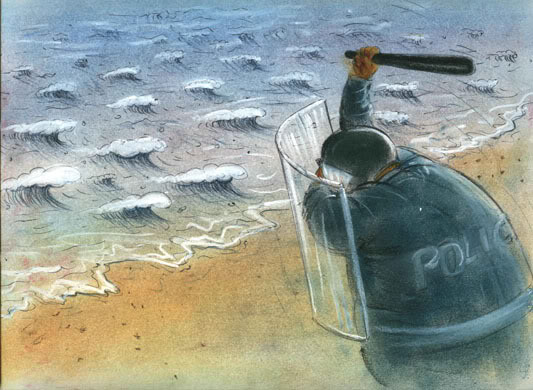
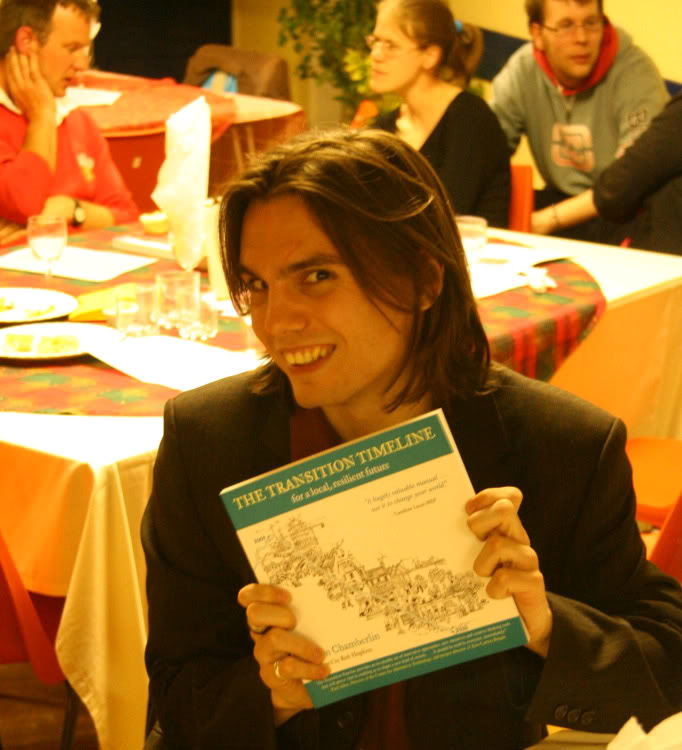
by Shaun Chamberlin | Jun 4, 2009 | All Posts, Climate Change, Cultural stories, Favourite posts, Peak Oil, Politics, Reviews and recommendations, TEQs (Tradable Energy Quotas), The Transition Timeline, Transition Movement
It has been another crazy whirlwind of a month, with this weekend set to be the first in five which I get to spend in Transition Town Home, having spoken recently in Bungay, Glastonbury, Belsize Park and the Forest of Dean, as well at the Transition Conference (I hate that name, can't we call it a 'Gathering' or something?) in Battersea, and at the Sunrise Celebration Festival.
One highlight for me was watching the world première of the movie "In Transition" and being surprised and delighted to find that I was in it (having completely forgotten the quick interview they grabbed with me at my book launch!). Another was meeting an A-Level teacher who is already using my book as a teaching aid for his Environmental Design students.
But perhaps of wider interest was the fact that Ed Miliband, Secretary of State for Energy and Climate Change, turned up at the Transition Conference as a 'keynote listener', but still managed to drop a few bombshells.
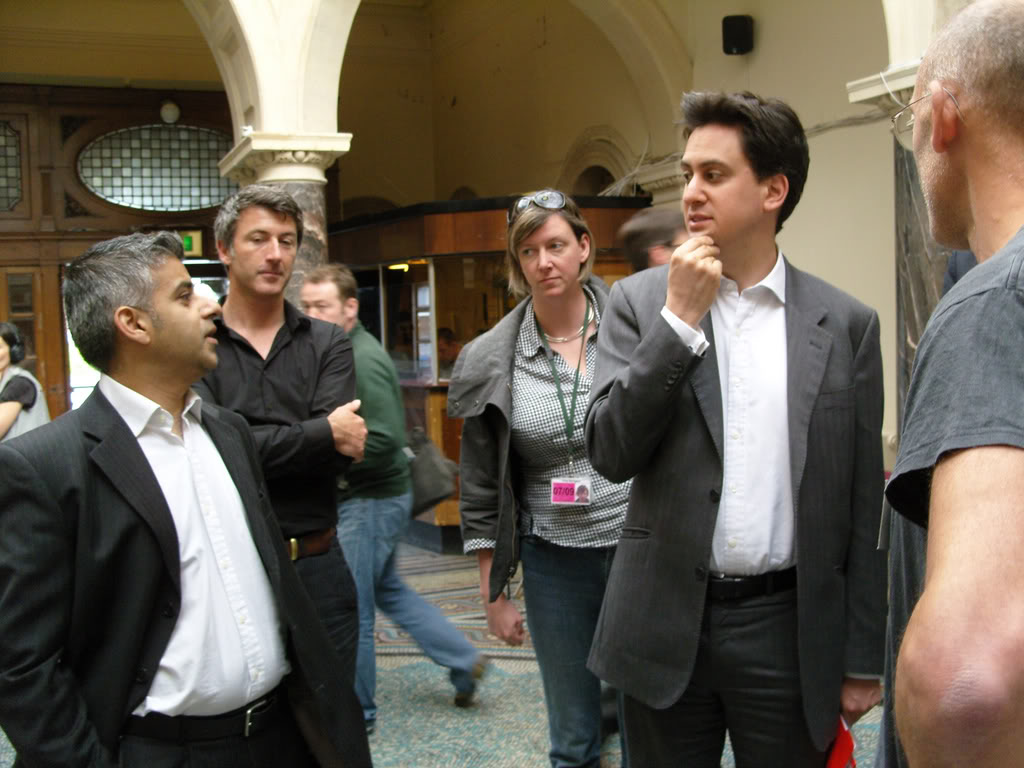 When we buttonholed him for a bit of a chat (audio here, courtesy of Traydio.com), I was pleased to hear that he understood the need for Government to remain a step removed from the Transition movement in order to avoid "strangling" it. However, I must confess I had to refrain from gasping as he declared that:
"If you think about the history of the debate on peak oil as I understand it, climate change makes debate about peak oil a bit of a second-order debate, because we have to start making the transition to low carbon forms of energy in any case. Whether you think that peak oil's in 2020, 2030 or 2040... I don't need to have the debate about peak oil... to know that we have to start making the transition as quickly as possible."
Where to begin? Clearly Ed's understanding of the history of the peak oil debate differs a little from mine. Let's start with the obvious - with many experts agreeing that we likely saw peak oil last year, for our Minister for Energy to be pondering how many decades in the future it might lie is, frankly, terrifying.
But what I personally find even more worrying is that he (and thus presumably his department) has not yet grasped that climate change and peak oil often pull in opposite directions. Perhaps Ed should cast his eyes across the Atlantic to the US Congress, where the advocates of Climate Change Bills (to implement strict carbon budgets) are doing battle with the champions of Energy Independence Bills (to subsidise carbon-intensive tar sands and coal-to-liquids projects).
When we buttonholed him for a bit of a chat (audio here, courtesy of Traydio.com), I was pleased to hear that he understood the need for Government to remain a step removed from the Transition movement in order to avoid "strangling" it. However, I must confess I had to refrain from gasping as he declared that:
"If you think about the history of the debate on peak oil as I understand it, climate change makes debate about peak oil a bit of a second-order debate, because we have to start making the transition to low carbon forms of energy in any case. Whether you think that peak oil's in 2020, 2030 or 2040... I don't need to have the debate about peak oil... to know that we have to start making the transition as quickly as possible."
Where to begin? Clearly Ed's understanding of the history of the peak oil debate differs a little from mine. Let's start with the obvious - with many experts agreeing that we likely saw peak oil last year, for our Minister for Energy to be pondering how many decades in the future it might lie is, frankly, terrifying.
But what I personally find even more worrying is that he (and thus presumably his department) has not yet grasped that climate change and peak oil often pull in opposite directions. Perhaps Ed should cast his eyes across the Atlantic to the US Congress, where the advocates of Climate Change Bills (to implement strict carbon budgets) are doing battle with the champions of Energy Independence Bills (to subsidise carbon-intensive tar sands and coal-to-liquids projects).
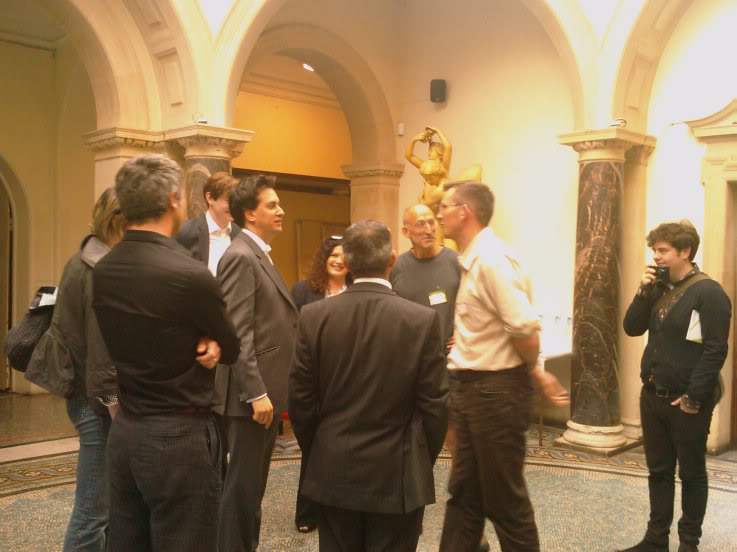 As I wrote here last year, and more recently in The Transition Timeline, there is a very real tension between addressing climate change and addressing peak oil, and policy based purely on one side of this equation could be very destructive indeed. Unfortunately, our government is still caught on the horns of this 'supply side dilemma', and is desperately casting around for more rapidly-deployable low-carbon energy supplies.
It is only slowly dawning on them that renewable supply cannot increase as fast as oil and gas are declining, that nuclear only makes the problem worse, and that coal is not an option if we want a habitable planet. The inescapable conclusion is that if we are to treat climate change with the seriousness which it undoubtedly deserves, then we may well have already entered our years of energy descent. The only reasonable response is to find ways to thrive in this context - to reduce energy demand in line with the reducing supply - but as yet Ed still believes that only Denial sells to the voting public:
"In a way I'm less optimistic than you are... you're optimistic that you can persuade people to adopt a sort of "no growth" model of society - I'm pretty convinced that you couldn't persuade people of that... Even if you were right about your model of society, I just don't believe that you're going to convince people of that"
Actually, I do agree with Ed that we need to think long and hard about what "economic growth" actually means before we debate whether we want it, though I'm not sure we'll see eye-to-eye when that debate reaches its head.
Of course it doesn't come as an overwhelming surprise to see my perspective deemed darker yet more optimistic than the Government view, but since the Transition Vision of the future seems about the only desirable outcome out there to shoot for, I think I'll just keep right on shooting, whether Ed rates our chances or not.
Having said that, with Rob's recent post on 'burn out' in mind, it's definitely time for a day off for me. Tomorrow is my birthday, and I will be taking a hard-earned breather at Kew Gardens with my beautiful and inspirational girlfriend. Back soon!
As I wrote here last year, and more recently in The Transition Timeline, there is a very real tension between addressing climate change and addressing peak oil, and policy based purely on one side of this equation could be very destructive indeed. Unfortunately, our government is still caught on the horns of this 'supply side dilemma', and is desperately casting around for more rapidly-deployable low-carbon energy supplies.
It is only slowly dawning on them that renewable supply cannot increase as fast as oil and gas are declining, that nuclear only makes the problem worse, and that coal is not an option if we want a habitable planet. The inescapable conclusion is that if we are to treat climate change with the seriousness which it undoubtedly deserves, then we may well have already entered our years of energy descent. The only reasonable response is to find ways to thrive in this context - to reduce energy demand in line with the reducing supply - but as yet Ed still believes that only Denial sells to the voting public:
"In a way I'm less optimistic than you are... you're optimistic that you can persuade people to adopt a sort of "no growth" model of society - I'm pretty convinced that you couldn't persuade people of that... Even if you were right about your model of society, I just don't believe that you're going to convince people of that"
Actually, I do agree with Ed that we need to think long and hard about what "economic growth" actually means before we debate whether we want it, though I'm not sure we'll see eye-to-eye when that debate reaches its head.
Of course it doesn't come as an overwhelming surprise to see my perspective deemed darker yet more optimistic than the Government view, but since the Transition Vision of the future seems about the only desirable outcome out there to shoot for, I think I'll just keep right on shooting, whether Ed rates our chances or not.
Having said that, with Rob's recent post on 'burn out' in mind, it's definitely time for a day off for me. Tomorrow is my birthday, and I will be taking a hard-earned breather at Kew Gardens with my beautiful and inspirational girlfriend. Back soon!

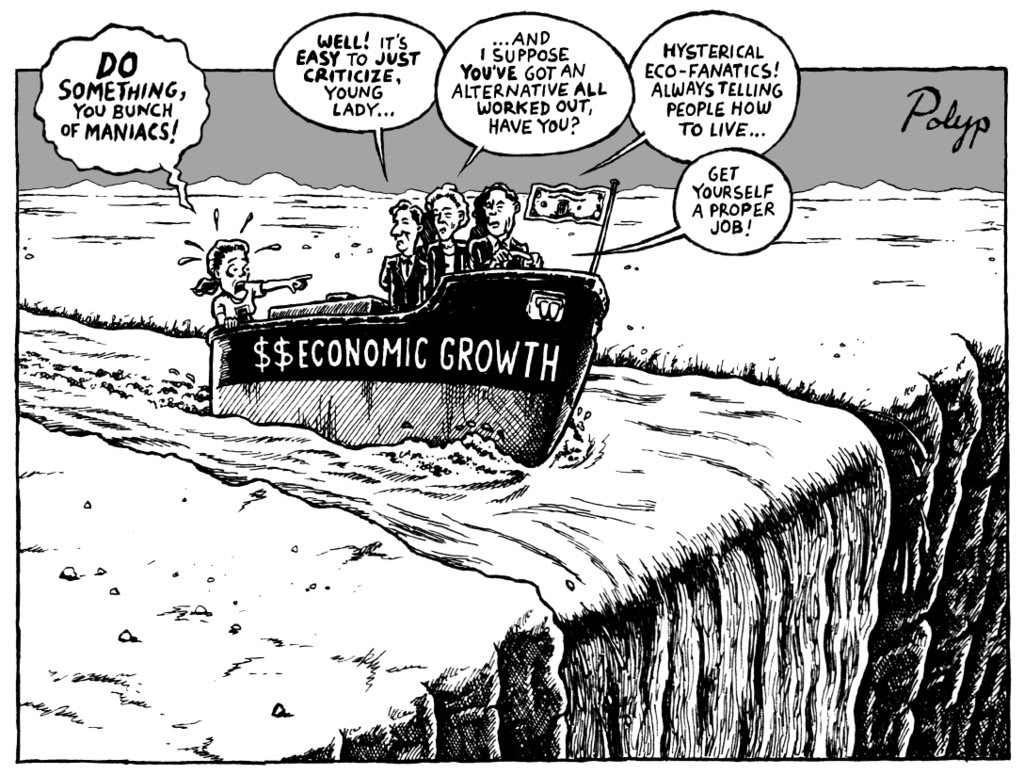
by Shaun Chamberlin | May 12, 2009 | All Posts, Climate Change, Peak Oil, Politics, TEQs (Tradable Energy Quotas)
I was delighted to read this week that my recent article in Resurgence magazine has helped inspire Bill Wilson MSP to champion TEQs (Tradable Energy Quotas) in the ongoing debate on the Climate Change (Scotland) Bill. Speaking in the Scottish Parliament, Dr. Wilson...

by Shaun Chamberlin | Nov 7, 2008 | All Posts, Climate Change, Politics
What with the founding of the new UK Department of Energy and Climate Change (DECC), our Government's commitment to 80% emissions cuts by 2050, the election of Barack Obama, the International Energy Agency acknowledging that "current global trends in energy supply and consumption are patently unsustainable" and the latest shudders of the moribund economic system, a lot has happened since my last post.
In fact I have had a real sense, both through public events and private discussions, that things are starting to shift - that finally a recognition of the collective nature and overwhelming severity of these challenges is starting to spread. That said, at this stage the problems still appear to be worsening more quickly than our awareness is improving and, crucially, the real challenges of the interactions between these crises and the implications of addressing them still remain largely unacknowledged.
One of Barack Obama's campaign promises was to reduce US greenhouse gas emissions by 80 percent by 2050, meaning that both the UK and US are now committed to this target. With their combined political clout, this is undoubtedly an important step in the right direction. Of course many have correctly pointed out that this target is nonetheless both insufficient and not quantified in the right terms, but what has been less widely discussed is the implications of actually achieving this target.
While Al Gore argues that "A political promise to do something 40 years from now is universally ignored because everyone knows it's totally meaningless", we are surely entitled to believe that when our Government commits to legally binding targets there must be at least some intention of their actually being achieved.
Yet no-one is able to explain how we can expect to reduce emissions by 80% by 2050 while continuing to experience a growing economy. Abstract talk of 'decoupling' notwithstanding, the logical conclusion is that the UK and US Governments are now legally obliged to shrink their economies by 2050.
 Of course the economist Kenneth Boulding famously said that "anyone who believes exponential growth can go on forever in a finite world is either a madman or an economist", but make no mistake, inevitable though it may be, the end of economic growth will be a painful process.
Putting all of this within a context of depleting energy resources leads rapidly to the conclusion that everyone's favourite Democrat is going to face one or two challenges over the coming years.
With all this in mind, the belated creation of DECC here in the UK must be seen as a hopeful sign. Minister Ed Miliband and his team have a chance to bring some joined-up thinking to an area where it has been conspicuous by its absence. Two colleagues of mine who have met with Mr. Miliband since his appointment have reported him to be refreshingly honest about his current lack of knowledge in the area. A touch of humility is long overdue in our approach, so I tend to see his eagerness to learn as a very positive indication.
Nonetheless, he will have to be a fast learner. If we adopt a reasonable set of parameters - that we must avoid runaway climate change, that we cannot rely on any energy sources that have not yet been invented - our options are shrinking by the day. It is already clear that reducing our demand for energy will be necessary, and it is equally clear that this could lead to great public outcry as perceived entitlements meet real limitations. Already the tightrope we are walking between climate change and peak oil is starting to fray...
ps Apologies to regular readers for the dearth of posts in the last month. I have been fully committed moving the Transition Timeline project towards completion.
Of course the economist Kenneth Boulding famously said that "anyone who believes exponential growth can go on forever in a finite world is either a madman or an economist", but make no mistake, inevitable though it may be, the end of economic growth will be a painful process.
Putting all of this within a context of depleting energy resources leads rapidly to the conclusion that everyone's favourite Democrat is going to face one or two challenges over the coming years.
With all this in mind, the belated creation of DECC here in the UK must be seen as a hopeful sign. Minister Ed Miliband and his team have a chance to bring some joined-up thinking to an area where it has been conspicuous by its absence. Two colleagues of mine who have met with Mr. Miliband since his appointment have reported him to be refreshingly honest about his current lack of knowledge in the area. A touch of humility is long overdue in our approach, so I tend to see his eagerness to learn as a very positive indication.
Nonetheless, he will have to be a fast learner. If we adopt a reasonable set of parameters - that we must avoid runaway climate change, that we cannot rely on any energy sources that have not yet been invented - our options are shrinking by the day. It is already clear that reducing our demand for energy will be necessary, and it is equally clear that this could lead to great public outcry as perceived entitlements meet real limitations. Already the tightrope we are walking between climate change and peak oil is starting to fray...
ps Apologies to regular readers for the dearth of posts in the last month. I have been fully committed moving the Transition Timeline project towards completion. It's now looking good and should be publicly launched next month. I look forward to hearing what you think, and should be posting more regularly again from now on. Edit - Seems I spoke too soon! The Transition Timeline is now being published as a book by Green Books, and so will be launched March 2009.

by Shaun Chamberlin | Sep 27, 2008 | All Posts, Cultural stories, Favourite posts, Peak Oil, Politics, Reviews and recommendations, TEQs (Tradable Energy Quotas)
[audio mp3="https://www.darkoptimism.org/wp-content/uploads/2008/09/Radio4.mp3"][/audio]
The "You and Yours" programme on BBC Radio 4 this week held a studio discussion on Peak Oil, with energy investment banker Matt Simmons, peak oil educator Richard Heinberg and the Chair of the UK All Party Parliamentary Group on Peak Oil, John Hemming MP. The 12 minute discussion can be heard above or here and includes discussion of the options open to the UK government, including Tradable Energy Quotas (TEQs).

by Shaun Chamberlin | Aug 17, 2008 | All Posts, Climate Change, Peak Oil, Politics, TEQs (Tradable Energy Quotas)
Last month I attended an Institute for Public Policy Research (IPPR) meeting called to announce their latest research into personal carbon allowances. Polly Toynbee was invited to chair the meeting, and was clearly impressed with what she heard as she has now written a very positive article about TEQs in her column in the Guardian. In it she reminds us of DEFRA's description of the scheme as "ahead of its time" and derides the Government's delay in moving towards implementation.
The IPPR have now joined our challenge to DEFRA's decision to delay a full feasibility study into TEQs, announcing that their research found that the public are far better disposed towards personal carbon allowances than DEFRA claim, and much prefer the idea to carbon taxation or upstream carbon trading (IPPR's research took the time to explain the three schemes rather more thoroughly than DEFRA had, which certainly helped on this score).





 When we buttonholed him for a bit of a chat (
When we buttonholed him for a bit of a chat ( As I
As I 





Recent Comments